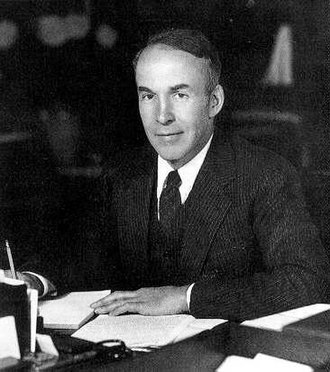But I do have a favorite poem: Ars Poetica by Archibald MacLeish.
I've read a lot of MacLeish and Ars Poetica is not his strongest piece-- for my money, that would be J. B., his verse play about Job. But the poem speaks to me about something I find important: how writing works.
I think of language is a code not a cipher. This is an important distinction. A cipher is a regular algorithm by which data can be encrypted or decrypted. Classical ciphers often used some algorithmic means by which words or letters were substituted. A very simple cipher might be to substitute the number placement of a letter for the letter. "ABCDE" becomes "12345", etc. "HELLO" would be "8-5-12-12-15".
A code, on the other hand, is a method of obscuring the original intent. It usually requires a key. For example, say you and I agree that the word "yellow" in a message means meet me at midnight under the harvest moon. If someone intercepts that message they have no idea what it means. There is no computational algorithm that can be used to determine yellow's meaning.
But the difference between a cipher and code is deeper. Philosophically, a cipher indicates that there is some rule set that can be applied to make the obscure open to scrutiny. A code, on the other hand, is an agreed upon communication protocol between two (or more) thinking beings.
Language is a tokenized communication protocol where something deeply personal and obscure (thoughts, eelings) are communicated one person to another via tokens for which we have some measure of agreement on their meaning. It is a code and not a cipher.
Writing a story is setting up a collection of words and images that are designed to invoke a response in the reader. Writers are encoding a state into words and expecting it to be decoded into emotions and narrative on the other side.
Cipher-thinking is deliberating on a set of rules and believing they will achieve an outcome. It's akin to magical thinking. You dance this way and that, turn three times, bay at the moon and bathe in the blood of a chicken and lo: you will have a best seller.
It can certainly work. There have been any number of pop songs and hack novels written strictly to formula without any other distinguishing mark.
Code thinking, however, is completely different. It recognizes that (minus telepathy) there is no possible algorithm by which we can express our innermost thoughts and feelings. We must mediate such communication through the inadequate tokens of words. Consequently, we introduce ambiguity and mistakes along with broader meaning. It means we do not present but invoke.
Back to MacLeish. Ars Poetica was written in 1925. T. S. Eliot's The Love Song of J. Alfred Prufrock was written in 1920. I find a lot of common ground in both of these poems. Prufrock seems to me a lament against the victory of form over substance. (An interesting side note, let us not forget Artaud's famous quote from The Theater and Its Double, 1938: "And if there is still one hellish, truly accursed thing in our time, it is artistic dallying with forms, instead of being like victims burnt at the stake, signalling through the flames.")
MacLeish, on the other hand, doesn't lament about it at all. He just tells us how it is done. One of my favorite lines in the poem: "A poem should be equal to. Not true."
Too often we indulge in cipher thinking. If I do this, I'll get that. If I love my wife I'll be happy. If I'm good to my kids, they'll turn out right. If I do what my parents ask, they'll approve of me. Cipher thinking is contractual. Life (and writing) are not contracts but agreements. We agree that I will give you the best effort at a story that I can. No guarantee can be made that you'll like it.
Of course, MacLeish said it much better:
A poem should not mean
But be




No comments:
Post a Comment